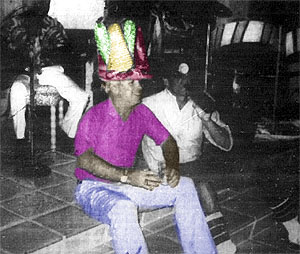
Thomas and Sheriff Joke
Hello from the state that has brought you John McCain. Sorry about that. You would think that would be enough shame for the Arizona Republican Party. Sadly, they have much more to offer. Reprehensible does not start to describe the efforts of the Arizona GOP and their poster boy of hate, Maricopa County Attorney Andrew Thomas. You may remember Thomas, he was behind the blatantly unconstitutional arrest and attempted prosecution of the two publishers of the local independent investigative weekly newspaper, The New Times.
Andrew Thomas is a young, extreme right wing, fundamentalist nightmare, and he, along with his best friend Joe Arpaio, are the law in Maricopa County, the home of Phoenix and the fourth most populated county in the United States. Here is the latest morally repugnant bile out of Andrew Thomas and the Arizona GOP:
An official with the Arizona Republican Party says he pulled an innuendo-heavy ad linking Tim Nelson, the Democratic candidate for county attorney, to defense lawyers in child- pornography and child-murder cases.
…
The ad refers to suggestions made in news releases, news conferences and interviews generated by Rose’s agency.
In mid-September, one of Rose’s associates issued a news release saying that a lawyer who defends pornographers contributed to Nelson’s campaign. Nelson donated the $390 in question to a charity for parents of murdered children.
"It’s sickening that they have sunk to a new low," Nelson said.
Nelson characterized Thomas’ attacks as "personal, mean and with false innuendo."
…
The Nelson ad opens with images of children riding tricycles and eating dinner at a family table.
"They deserve a safe neighborhood, a secure home," a woman’s voice says. "They deserve the innocence of childhood and all of its wonder. And they deserve to be protected."
Then there’s a drum roll and a frowning photo of Tim Nelson flashes on screen.
"But can they count on liberal ACLU lawyer Tim Nelson?" the woman continues. "He took money from a child pornographer and from lawyers who defend child murderers. Liberal Tim Nelson isn’t just wrong. He’s dangerous."
What are Tim Nelson’s crimes? That fully upstanding citizens, that happen to be employed as criminal defense attorneys, contributed to his campaign. Oh, yes, and that over ten years ago, the firm that Nelson worked at was appointed by the court to assist an indigent defendant with a death penalty appeal. Not Nelson personally understand you, just his firm. Wonderful. Read more →



